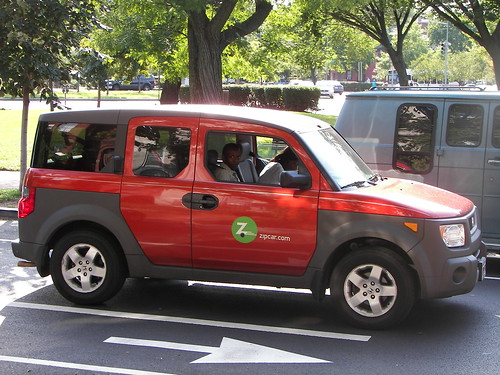Another example of DC's failures in transportation planning: carsharing
-----
I forgot to disclose that I am a Zipcar member. We use it occasionally for its convenience. But when we want to use a car and we plan ahead, we rent cars from places at Union Station, because it's cheaper.
Still, it's very cool, and is part of a change in consumption patterns, called collaborative consumption. See "The Sharing Economy," from Fast Company. Car sharing is one of the first larger scale illustrations of this trend (as is bike sharing).
Also see the TBD piece on car ownership patterns in the DC region (not just DC), "Nearly 200,000 DC Households Survive Without Any Cars."
--------
Zipcar lost out to new services for most of the spaces they use currently, even though they have the most members and users in DC of any service. So they are engaged in a media and advocacy campaign to get more spaces.
Mike DeBonis of the Post has a piece about it here, "Zipcar and fair prices for public spaces" and he makes good points about balancing revenue needs vs. helping innovative businesses to develop.
In 2005, I too was somewhat skeptical about giving "free" spaces on the street to carsharing programs like Zipcar and the then Flexcar service, because they were "for profit companies" "making money off the public space." See "Dr. Transit: Car Sharing in DC."
But later on, in October 2005, I had an epiphany, and realized that I missed the point, that the issue for residents is should car owners have more privileges that car users for the use of street spaces? I wrote about it here, "High Cost of Free* Parking Revisited and Car Sharing in DC." From the piece:
One of the DCist commenters mentioned the Arlington County Commuter website, in particular the section on Car Sharing, and the report (Arlington pilot carshare program first-year report) that Arlington produced based on their pilot study of this program. According to the Arlington website, various studies find these carsharing benefits:
• reduces car ownership,
• encourages more transit trips,
• reduces the number of cars on the road,
• reduces the number of vehicle miles traveled (VMT),
• reduces pollution,
• saves gas, and
• provides for a more efficient use of parking spaces.
In DC, car owners pay $15/year for a residential parking space, for a space that DC evidently believes is worth $3,600, because that is the price set for bidding for control of parking spaces for carsharing services on the city's streets.
Research shows that each car in a carsharing service serves 10-20 members, and significantly reduces the number of cars owned by residents.
Given that there is a relatively scarce amount of parking space inventory in DC neighborhoods, especially rowhouse neighborhoods, where a typical car is about as wide as a rowhouse (so any house with more than one car puts extreme pressure on the inventory), carsharing should be encouraged, and the higher the price of a parking space to the carsharing company, the higher the price is for hourly use for members, which discourages people from joining. Maybe more people buy cars.
In the Arlington County Transportation Plan, reducing single occupancy vehicle use is a key priority. Therefore, each element of the plan supports this priority to the extent possible.
Clearly, this kind of nuanced focus is beyond DC's capacity.
Labels: car culture and automobility, car sharing, parking and curbside management, transportation planning




0 Comments:
Post a Comment
<< Home